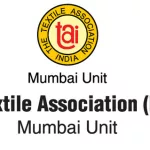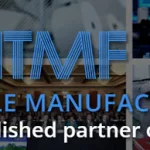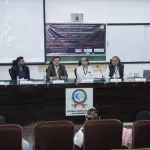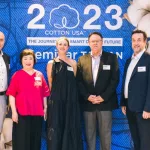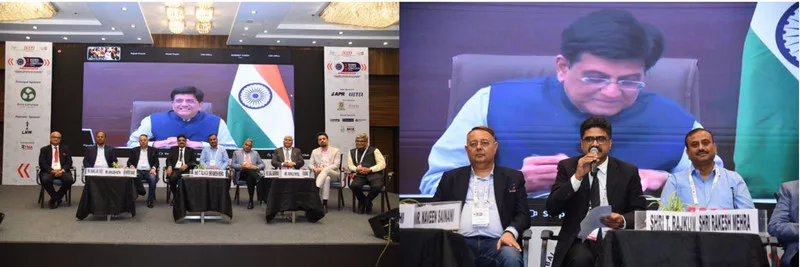
Shri Piyush Goyal, Union Minister of Textiles, addressing 3rd GTC through Video Conferencing
The Confederation of Indian Textile Industry recently organized the 3rd Global Textiles Conclave (GTC) from March 15 – March 17, 2023, in Jaipur. The event was inaugurated by the Union Minister of Textiles, Shri Piyush Goyal, through a video conference held in Jaipur on March 15, 2023.
Addressing the event, the minister praised the efforts of the Confederation of the Indian Textile Industry (CITI) towards improving sustainability in the textile value chain. He congratulated CITI for organizing the 3rd edition of GTC, which was themed “Strategies for Balancing Sustainability and Profitability in Textile Value Chain.” The Minister also lauded the first edition of the India Textile and Apparel Fair (ITAF) and the CITI Textile Sustainability Awards 2023. Shri Goyal was pleased that the conclave was held on World Consumers’ Rights Day and highlighted how consumers are now more conscious of their environmental footprint and demanding transparency in the products they use. He also pointed out that the EU has already initiated Carbon Border Adjustment Tax reforms, which is an early sign of the need for adopting sustainability to overcome climate change challenges.
The Minister stressed that the Government is doing its best to provide the necessary ecosystem for the textile industry to thrive and that the entire textile value chain can be relocated to one place, where plug-and-play model infrastructure will be made available. This will help boost the 5 F vision of Prime Minister Modi and make Indian textile products competitive in foreign markets. Further, the Minister urged the industry players to collectively pledge towards mainstreaming sustainability and circularity in the textile sector. He emphasized the need for evolving businesses around the three P’s – People, Planet, and Profit, and collaborating with premier institutions like IIT’s, DRDO, NIFT for research and development to create sustainable supply chains. He also exhorted the industry to make zero defect zero effect their success mantra and focus on research, sustainable practices, compliance, and innovation, including the start-up ecosystem, to leverage technology and new ideas.
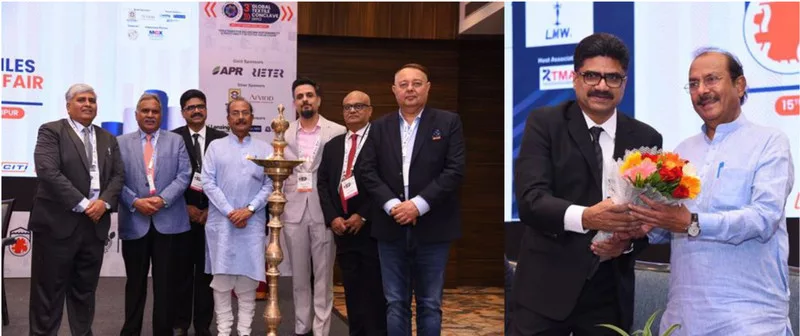
Shri Rajiv Arora, Chairman Rajasthan Export Promotion Council inaugurating India Textile and Apparel Fair (ITAF) on the side-lines of 3rd GTC in Jaipur
The India Textile and Apparel Fair (ITAF) was inaugurated with the traditional lighting of the lamp by Shri Rajiv Arora, Chairman, Rajasthan Export Promotion Council Dr. SN Modani, Chairman of the Rajasthan Textile Mills Association Shri T Rajkumar, Chairman of the Confederation of Indian Textile Industry, Rakesh Mehra, Deputy Chairman of CITI.
Dr. SN Modani, Chairman of the Rajasthan Textile Mills Association, gave the opening speech, highlighting the importance of the textile and apparel industry in India’s economy. He also stated that the industry is notorious for climate-related risks and emphasized the need for sustainable manufacturing practices.
Shri T Rajkumar, Chairman of the Confederation of Indian Textile Industry (CITI), followed Dr. Modani’s speech and talked about the importance of Rajasthan in the T&A ecosystem. He announced the agenda for the three-day event, which included ITAF, GTC, and Sustainable Textile Awards 2023.
Shri Rajiv Arora, Chairman of Rajasthan Export Promotion Council (REPC), gave the inaugural address on behalf of the Rajasthan government. He invited industry stalwarts to invest in Rajasthan and promised a roadmap for boosting trade. He also announced plans for a Mega Textile Park and a robust air-freight system to facilitate trade in Rajasthan. Mr. Arora emphasized the importance of sustainability and green power to make businesses more sustainable.
The inaugural session of ITAF concluded with Rakesh Mehra, Deputy Chairman of CITI, welcoming all the attendees and reiterating the importance of sustainability and the environment in the textile and apparel industry.
The event was a great platform for industry leaders to come together and discuss the future of the textile and apparel industry in India. The focus on sustainability and the environment is a step in the right direction for the industry to grow while minimizing its impact on the environment.
Theme Session: Balancing Sustainability and Profitability in the Textile Industry
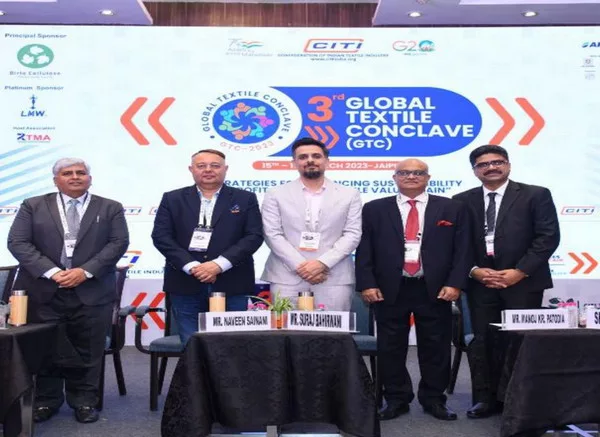
Panellists for the Theme Session on ‘Balancing Sustainability and Profitability in the Textile Industry in CITI’s 3rd GTC in Jaipur
The textile industry has long been criticized for its negative impact on the environment, with fast fashion being one of the primary culprits. However, the industry also plays a significant role in the economy, providing employment and contributing to the country’s GDP. In this context, finding a balance between sustainability and profitability has become a pressing issue.
A theme session on ‘Balancing Sustainability and Profitability in the Textile Industry’ at 3rd GTC featured experts from different areas of the textile industry. Dr S N Modani from the Rajasthan Textile Mills Association talked about slowing down fast fashion and adopting traceability solutions.
Dr Suraj Bahirwani, the President of Global Sales at Grasim Industries, emphasized the majority of the industry’s concentration in the MSME category and discussed custom duties and GST structures in the Indian textile value chain. He also highlighted initiatives taken by Aditya Birla Group – Grasim Industries, including product innovation, end-to-end tracking through QR codes, the Liva Accredited Partners Forum, and research and development support.
Mr Manoj Kumar Patodia, the Chairman of TEXPROCIL, stressed the importance of sustainability and circularity, highlighting the need for recyclability and traceability.
Given that India has one of the largest acreages under cotton cultivation, he also emphasized the need to raise its low productivity.
Mr Naveen Sainani, the Joint Honorary General Secretary of the Clothing Manufacturers Association of India (CMAI), discussed the immediate versus long- term profitability and how Indian consumers are also concerned about sustainability. He suggested the ABCE framework, including increasing awareness, building the brand around sustainability, promoting conscious clothing, and adopting environment and sustainability management systems.
The experts also discussed the role of government support in skilling and handholding to promote sustainability in the industry.
Overall, the session provided valuable insights into how the industry can balance sustainability and profitability, emphasizing the need for collaboration among stakeholders to drive change. By adopting innovative solutions, promoting conscious clothing, and investing in sustainability and circularity, the industry can move towards a more sustainable future, contributing to both the economy and the environment.
Session 1: Trends On Fibre Value Chain – Exports & Domestics
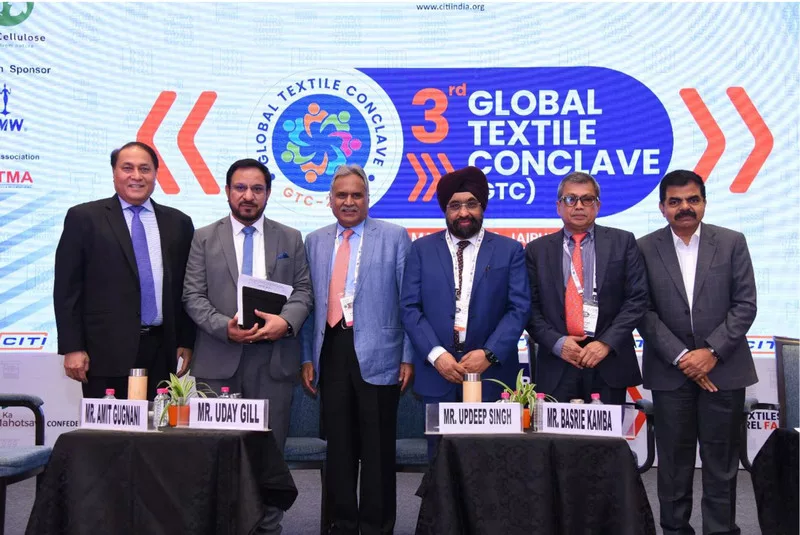
Panellists for the Session on ‘Trends On Fibre Value Chain – Exports & Domestics’ in CITI’s 3rd GTC in Jaipur
The textile and apparel (T&A) industry is undergoing a significant transformation due to various factors, including sustainability concerns and changes in global trade policies. Session on “Trends On Fibre Value Chain – Exports & Domestics” moderated by Mr. Amit Gugnani, from Technopak Advisors, shed light on the key changes and innovations in the T&A industry.
One of the significant changes in the T&A industry is the shifting focus on sustainability and circular economy. The industry’s globalized value chain, which is both a boon and a bane, has been impacted by the Russia-Ukraine shockwaves felt in India’s T&A trade. Inflation has also affected apparel exports, which necessitates re- looking at the industry’s different value models.
According to Mr. Uday Gill from Indorama Yarns and Fulbright Scholar, the way Indian players are driven by cost, scale, and imitation of China’s model is not sustainable going forward. Garmenting is the growth engine, and sustainability becomes key to product design, manufacturing, and consumption. Consumer needs at all levels will be moulded by social media, and skilling and automation are required for diligent production.
While natural fibers are inconsistent with respect to functionality, recycling is still primitive, and only mechanical recycling is big. Designing end products keeping circularity in mind is imperative. We need to build an India story for green textiles, keeping in mind our strengths.
Mr. Elangovan from AEPC, Tirupur Export Association, SNGS, emphasized on the importance of newly formed norms of the US & EU, who are the largest T&A trade partners of India. More and more brands are not only asking for a greener value chain but also helping with the handholding process by turning green with their practices.
Even though sustainability and circularity are becoming global norms, performance fibers will stay for the foreseeable future.
Mr. Updeep Singh, the President/CEO of Sutlej Industries, highlighted the importance of a value chain collaboration and suggested taking the cost of sustainability as a transition cost.
In conclusion, the T&A industry is undergoing a significant transformation, and sustainability is at the forefront of this change. Designing end products keeping circularity in mind, building an India story for green textiles, and a value chain collaboration can drive sustainability and circularity in the T&A industry.
Session 2: Investment Opportunities in India for Global T&C Value Chain
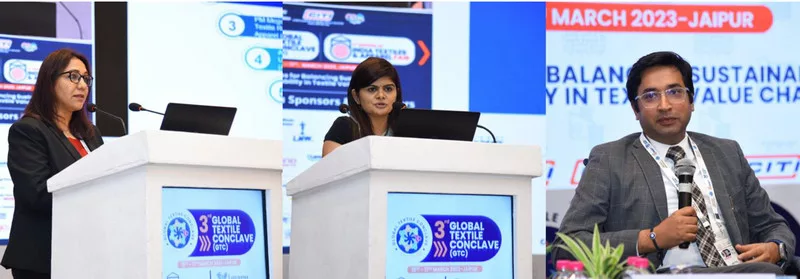
Panellists for the Session on ‘Investment Opportunities in India for Global T&C Value Chain in CITI’s 3rd GTC in Jaipur
During Session 2 of the conclave, Ms Bhavna Rathee from Invest India, Ms Sonam Bhandari from BSR & Co, and Mr Nikit Popli from KPMG discussed the investment opportunities in India’s Textile and Apparel (T&A) industry. The session began with an overview of historical statistics of Foreign Direct Investment (FDI) in the industry.
The speakers then talked about the effectiveness of the Production Linked Incentive (PLI) scheme, which has helped formulate state policies and attract investments. They cited the success story of Madhya Pradesh, which has attracted 3,513 crore rupees in investment.
The discussion focused on how to make the investment climate more attractive, and the aspects that are being looked into include lowering the threshold levels for availing PLI incentives and widening the product base for the scheme. They also suggested looking at the inverted duty problem faced by manufacturers, which hinders their competitiveness in the global market.
To give a holistic picture of investment attractiveness, the speakers also discussed schemes like Export Promotion Capital Goods (EPCG) and Market Access Initiative (MAI). The session concluded with a Q&A session where attendees had the opportunity to ask questions and engage with the speakers.
Overall, the session provided valuable insights into the investment opportunities available in India’s T&A industry and the steps being taken to make the investment climate more attractive. The PLI scheme and other government initiatives have already shown success in attracting investments, and there is a positive outlook for the industry’s growth and development.
Session 3: India – UAE Fostering Economic Ties
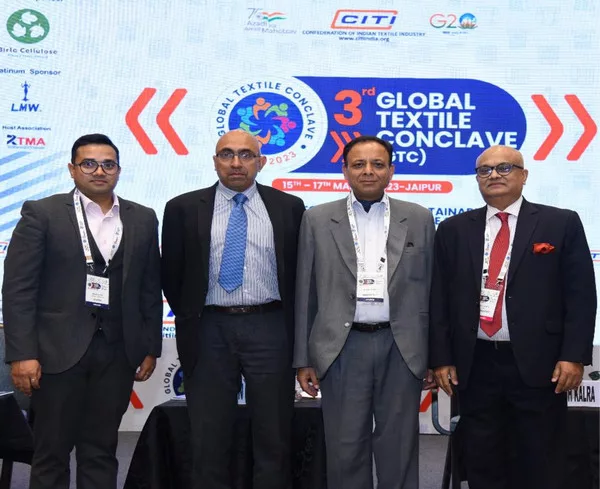
Panellists for the Session on ‘India – UAE Fostering Economic Ties’ in CITI’s 3rd GTC in Jaipur
In this session on Trade with UAE, experts discussed the enactment and effects of the CEPA (Comprehensive Economic Partnership Agreement) between India and the UAE. The importance of international trade cannot be overstated, and in this regard, the India-UAE trade partnership has been gaining traction.
The session was opened by Mr. Mukesh Kalra from the UAE India Business Council (UIBC) who highlighted the significance of India-UAE trade. He emphasized the role of the textile and apparel industry, which has been a major contributor to the growth of trade between the two countries.
Mr. Ankur Gupta from SW India presented a comprehensive picture of the impact of the FTA (Free Trade Agreement) between India and UAE. He touched upon various aspects of the agreement, such as tariff reduction and market access, and highlighted the benefits for the textile and apparel sector.
Finally, Mr. Bipin Menon from the Directorate General of Foreign Trade (DGFT) gave a detailed explanation of duty remission with respect to Rules of Origin. He explained the technicalities of 6 Digit CTH (Customs Tariff Heading) and CTSH (Customs Tariff Sub-Heading) level, which are used to determine the origin of products traded between the two countries.
Despite the positive impact of the FTA, the session concluded on a note that India- UAE trade has yet to achieve its full potential in the textile and apparel sector. While the CEPA has opened up new avenues for trade, it is imperative that the two countries work towards further strengthening their trade relations to achieve a robust T&A trade engagement. The experts emphasized the need for continued efforts to promote bilateral trade, increase market access, and explore new opportunities for collaboration.
Session 4: Responsible Consumption and Production
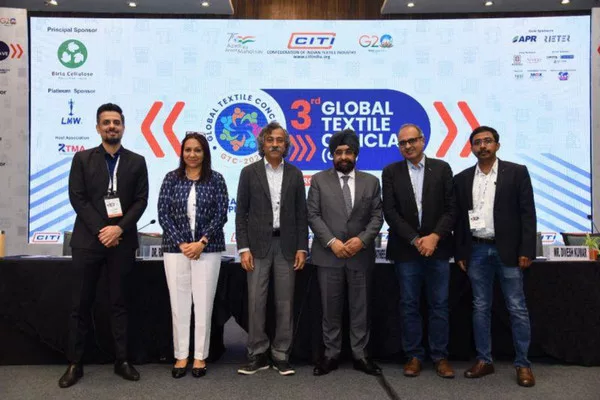
Panellists for the ‘Responsible Consumption & Production’ Session in CITI’s 3rd GTC in Jaipur
‘Responsible Consumption and Production’ Session of the conclave brought together experts from different sectors to discuss Responsible Consumption and Production.
Moderated by Dr. Rajesh Bheda, the session started with him commending CITI for instituting the Sustainability awards that recognize good practices and inspire others to embrace sustainability in their business practices. In his opening remarks, Dr. Bheda emphasized the importance of industry-wide actions involving all stakeholders in the supply chain for promoting SCP.
The session shared good practice case studies from companies like Patagonia, H&M, Primark, ABFRL, and Shahi Exports. Dr. Bheda highlighted how productivity improvement and waste reduction can help in maintaining a balance between sustainability and profitability. The discussion was stimulating and covered a wide range of topics related to sustainable practices in the industry.
Dr. Suraj Bahiwani shared the progress made by Grasim, including sustainable forestry, circular fiber with traceability, and other aspects of sustainability. Ms. Bhavan Rathi talked about the initiatives of the Government of India in attracting green investments and how MSMEs are being supported in embracing sustainability.
Mr. Peush Narang emphasized the need for credible measurement of sustainability indicators and shared how his organization has been able to work on reducing water consumption year on year, using blockchain technology for transparency, and what more can be done by the fashion industry towards ensuring responsible production and consumption. Mr. Subhais Basu shared how LNJ Denim has made progress on energy and water waste reduction and continues to report on their progress.
The session ended with a lively discussion on the need for effective communication of the great progress made by path breakers from India and encouraging others to embrace sustainability as the way for a sustainable future. The experts reiterated the importance of taking collective action for responsible production and consumption practices that benefit the environment, society, and the economy.
Session 5: Technology and Innovation
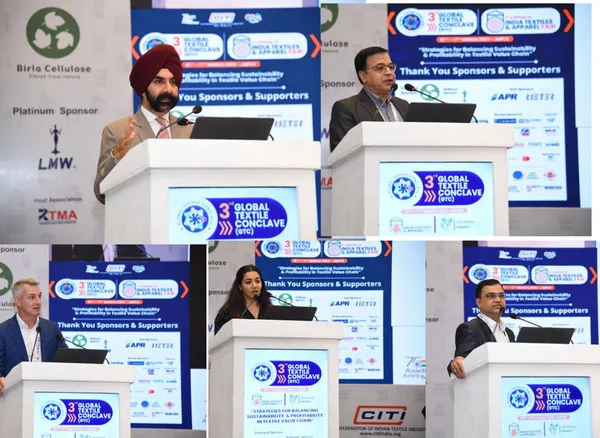
Panellists for the ‘Technology and Innovation’ Session in CITI’s 3rd GTC in Jaipur
The fifth session of 3rd Global Textile Conclave focused on the topic of Technology and Innovation. Navdeep Singh Sodhi, Partner at Gherzi Textil Organisation, Switzerland, moderated the session, which featured a panel of experts from the textile industry.
These included Prasanta Deka from Rieter, Vivek Arora from LMW, Priyanka Khanna from Fashion for Good, Dr. Swapneshu Baser from Deven Supercriticals, Manisha Saroha Marival from CETI, and James Phillips from Gherzi Textil Organisation ASEAN.
Each panelist gave presentations on various topics related to sustainability, recycling, disruptive technologies, and digital advancements in the textile industry. Prasanta Deka shared statistics that indicated how, due to a fragmented value chain and lack of proper infrastructure, we are currently only able to recycle and reuse 1% of the 89 million tons of collected pre and post-consumer waste. However, the industry continues to strive towards the potential target of 15%. Rieter spoke about its collaboration with brands such as Recover, Birla Cellulose, and Spinnova, which enables them to become part of a bigger picture and contribute to their share of recycled and regenerated raw materials available in the supply chain.
Mr. Vivek Arora spoke about the key challenges facing the industry today and the impact of each process on environmental resources. He shared glimpses of the initiatives taken up by the organization to reduce, control, and utilize natural resources, including the opening of another green factory installment of COATS yarns in Madurai. With their new range of green machines, they promise to save up to 50% of power and up to 5 dB noise reduction, resulting in a reduction of 79 million kgs of CO2 per year.
Ms. Priyanka Khanna introduced Fashion for Good and how it has been working over the years as a strategic partner to suppliers and manufacturers, liaising with brands to bridge their needs with sustainable practicing technologies and bringing them within the value chain.
Ms. Manisha joined the session via Zoom and showcased CETI’s potential as a digitally enabled partner, bringing in different types of designing, product development sorting, and recycling technologies in the value chain. She also brought attention to all three recycling methods – Mechanical, Chemical, and Bio-chemical recycling factories – they have set up over the years and their progress Dr. Baser spoke in-depth about his innovation in Supercriticals and its advancements in comparison to other dying methods currently in practice. It has shown exponential promise of being a waterless dying solution. His achievements have even been noticed and awarded by the ex-President of India, Dr. APJ Abdul Kalam.
James Phillips, a Partner at Gherzi Textil Organisation and former CEO at TAL, a Vietnamese garment manufacturer, shared his experience of working in the RMG industry and the digital advancements made in the sector. He spoke openly about the crisis faced by RMG manufacturers and retailers of overstock piled up, and the solution to it is Made to Measure (MTM). Although MTM is still very young in practice and limited to countries like the US, UK, and parts of the EU, it is a solution to meet the demand on a need basis only and which, in return, will be sustainable and ecologically beneficial.
The panellists also highlighted the importance of collaboration between brands, suppliers, and manufacturers to achieve sustainability goals. They emphasized the need to adopt sustainable practices not just as a trend, but as a long-term strategy to address environmental and social issues.
Moreover, the panellists discussed how advancements in technology are shaping the future of the textile and apparel industry. They talked about the role of digitalization, automation, and artificial intelligence in improving efficiency, reducing waste, and increasing transparency in the supply chain.
Overall, Session 5 on Technology and Innovation was a great learning experience for the attendees. The panellists shared valuable insights on sustainability, recycling, disruptive technologies, and digital advancements in the RMG sector. They highlighted the need to work together to achieve sustainability goals and embrace technology to improve efficiency, reduce waste, and increase transparency in the supply chain. It was a reminder that sustainability and innovation go hand in hand and that both are essential for the growth and success of the textile and apparel industry.
Session 6: Technical Textiles
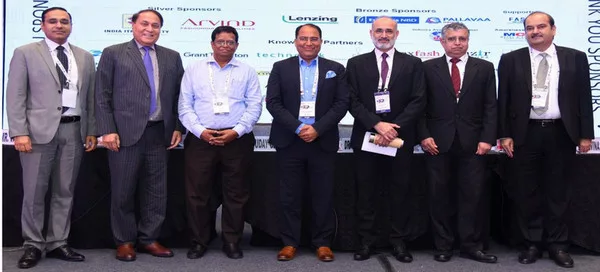
Panellists for the ‘Technical Textiles’ Session in CITI’s 3rd GTC in Jaipur
The technical textiles industry is rapidly growing, with an estimated market size of 300 Bn $ and a 5% CAGR. The industry includes various segments, such as Meditex, Sportstex, Protection and Safety Textile (Defence), Geotex, and Agritex. However, potential investors need to be aware of the high regulatory and buyer-driven ecosystem, which has long gestation periods compared to conventional products.
The session was moderated by Wazir Advisors Jt MD, Mr. Prashant Agarwal, and Business Director, Mr. Varun Vaid, experts provided insights for investors and collaboration opportunities in the technical textiles industry. One of the key takeaways from the session was the lack of collaboration between technicians/engineers and textile manufacturers. The experts suggested that facilitating collaboration between educational institutions and the industry could help bridge this gap.
The session was a reality check for potential investors, emphasizing the importance of understanding the high regulatory and buyer-driven ecosystem of the technical textiles industry. The experts stressed that the technical textiles market’s gestation period is often lengthy due to various approvals required. They also noted that the industry has a high level of regulation, which can be a barrier to entry for new players.
However, the technical textiles industry offers significant growth potential, and collaboration between stakeholders can help unlock this potential. The experts highlighted the importance of collaboration between technicians/engineers and textile manufacturers to improve product understanding and performance. They also emphasized the need for collaboration between educational institutions and the industry to facilitate innovation and bridge the gap between academia and industry.
The panellists emphasized that the technical textiles market’s gestation period is often lengthy due to the various approvals required, and thus, partnerships are crucial to reducing the learning curve. They highlighted the need for cross-disciplinary centres of excellence beyond textiles, which should be funded by means other than government grants. The experts noted that while downstream conversion opportunities are more attractive than raw materials, deep customer and product application understanding is essential for success.
To stay ahead of the game, in-house research and development (R&D) and application teams are a necessity. Existing products may become obsolete over time, and innovation is key to maintaining a competitive edge. Consistency and top-level performance are paramount in this industry, given its direct implications for human life.
The panel’s insights have significant implications for the R&D ecosystem. Cross- disciplinary centres of excellence, funded by means other than government grants, would create a more robust and innovative R&D ecosystem. The industry can also benefit from partnerships with downstream industries to improve product understanding and performance. In-house R&D and application teams will be necessary to stay ahead of the curve and ensure consistency and top-level performance.
The panel’s discussions highlighted the industry’s potential and the need for collaboration among stakeholders to promote its viability. Technical textiles have immense applications in various fields, including healthcare, sports, transportation, and industrial safety. As the industry continues to grow, partnerships, government support, and cross-disciplinary functions will become increasingly crucial for success.
The technical textiles industry has a promising future, with immense potential for growth and innovation. By investing in partnerships, cross-disciplinary centres of excellence, and in-house R&D, the industry can stay ahead of the curve and ensure consistency and top-level performance. The industry’s success is essential for improving human life and creating a sustainable future.
In conclusion, the technical textiles industry offers immense growth potential, but potential investors must be aware of the high regulatory and buyer-driven ecosystem.
Session 7: Regional Cooperation Through Textile Trading
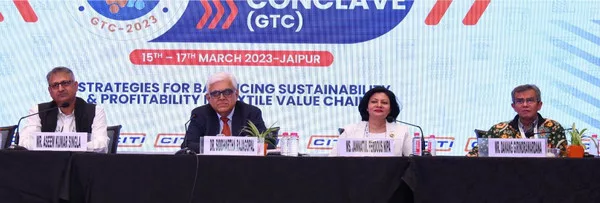
Panellists for the ‘Regional Cooperation Through Textile Trading’ Session in CITI’s 3rd GTC in Jaipur
The textile industry is a key economic driver for many countries around the world, and the importance of regional cooperation in the industry cannot be overstated. This was the focus of Session 7 at a recent textile conference, which looked at the benefits and challenges of textile trading and cooperation between countries.
The session was moderated by Dr. Siddhartha Rajagopal Executive Director, The Cotton Textiles Export Promotion Council a panel of experts, including Mr. Danang Girindrawardana Executive Director, API – Indonesia Textile Association, Ms. Jannatul Ferdous Nipa Vice – President (RMG), Indian Importers Chambers of Commerce & Industry (IICCI), Bangladesh and Mr. Aseem Kumar Singla Director, Fashion Images Overseas.
The panel highlighted the importance of regional cooperation in textile trading, par particularly in the context of the ongoing global pandemic, which has disrupted supply chains and caused major economic challenges for many countries.
The panel discussed various issues related to textile trading, including the role of government policies, regulations, and incentives in facilitating trade, the importance of building relationships and trust between trading partners, and the need for investment in infrastructure and technology to support textile trade.
One of the key themes that emerged from the session was the importance of building a sustainable textile industry through cooperation and collaboration. This means not only working together to facilitate trade, but also taking steps to ensure that the textile industry is environmentally sustainable and socially responsible.
The panelists highlighted the need for greater transparency in the supply chain, as well as for better traceability and accountability in the production process. They also emphasized the importance of investing in sustainable technologies and practices, such as recycling and waste reduction, in order to reduce the environmental impact of the textile industry.
Another important issue discussed during the session was the role of small and medium-sized enterprises (SMEs) in textile trading. The panelists noted that SMEs are often key players in the textile industry, particularly in developing countries, and that they face unique challenges in accessing markets and building relationships with trading partners.
To address these challenges, the panelists stressed the need for greater support for SMEs, including access to financing, training, and technology. They also emphasized the importance of creating a level playing field for SMEs, particularly in terms of regulatory compliance and access to markets.
Overall, the session on regional cooperation through textile trading highlighted the importance of collaboration and partnership in building a sustainable and thriving textile industry. By working together to address common challenges and build a more sustainable and responsible industry, countries can reap the economic benefits of textile trading while also protecting the environment and promoting social responsibility.
Confederation of Indian Textile Industry (CITI) and Indonesia Textile Association MoU signing
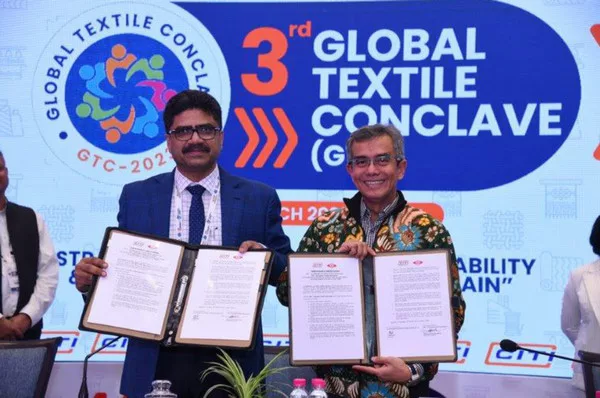 Confederation of Indian Textile Industry (CITI) and Indonesia Textile Association signing an Memorandum of Understanding (MOU) for bilateral textile and apparel trade promotion and cooperation between both the organisation.
Confederation of Indian Textile Industry (CITI) and Indonesia Textile Association signing an Memorandum of Understanding (MOU) for bilateral textile and apparel trade promotion and cooperation between both the organisation.
Session 8: Increasing Economic and Social Cooperation for Women in the Textile and Apparel Industry
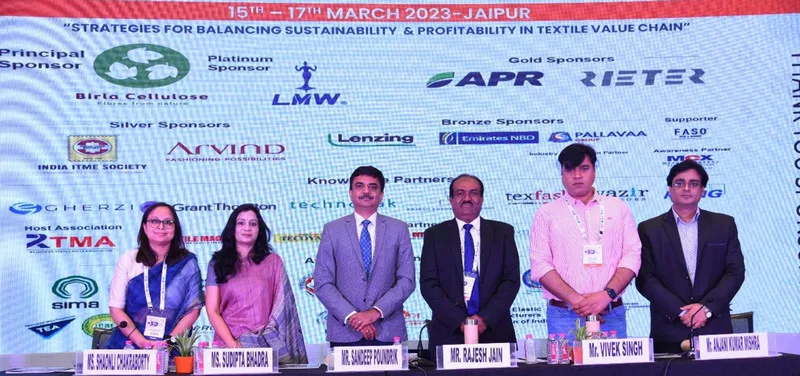
Panellists for the ‘Increasing Economic and Social Cooperation for Women in the Textile and Apparel Industry ’ Session in CITI’s 3rd GTC in Jaipur
Session 7 of the conclave discussed the topic of increasing economic and social cooperation for women in the textile and apparel industry. The session began with Mr. Sandeep Poundrik (IAS) sharing insights on the steps taken by Bihar to promote trade in the sector while also facilitating greater participation of women. He highlighted the revival of the Muzaffarpur Bag cluster through government intervention by setting up an anchor unit and encouraging other units to set up in the same area. Mr. Poundrik also mentioned Jeevika, a government subsidiary that is helping transform the industry in Bihar.
The next speaker, Mr. Rajesh Jain from Grant Thorton, focused on the historical evolution of women’s role in the trade and discussed the importance of decentralization of clusters to create new opportunities for women. This would eventually reduce migration and marginalization of women.
Representing the industry on the panel, Mr. Anjan Mishra from Shahi Exports talked about various initiatives taken by Shahi to re-skill women and facilitate female employee retention in their factories. He also emphasized the need to increase female labor force participation in textiles, citing higher productivity attributed to females.
One of the initiatives that he mentioned was ‘Inache’, an anonymous grievance redressal platform that ensures female workers’ voices are heard.
Ms. Sudipta Bhadra from the ILO emphasized the widening price competition in globalized value chains resulting in further marginalization of women. She highlighted the reasons for the same, including low payment of wages, unsafe working conditions, discrimination in terms of promotion, lack or absence of toilets/changing rooms, and accommodation options. Ms. Bhadra rightly said that merely audits will not solve this problem. Weak institutions are the root cause of the problem, and solutions must be embedded in the governance initiatives of companies, including due diligence of wage payment and skilling initiatives.
Other experts on the panel, including Mr. Vivek Singh from the Center for Responsible Business, highlighted that brands are increasingly preferring manufacturers who comply with stringent social norms. He also talked about how companies must look at social sustainability as an export promotion strategy.
Overall, the session shed light on the need for increased economic and social cooperation for women in the textile and apparel industry. The industry experts and government representatives agreed that systemic changes are necessary to create a more inclusive and sustainable future for women in the sector.
Session 9: Skilled Workforce For Strong, Sustainable And Balanced Growth
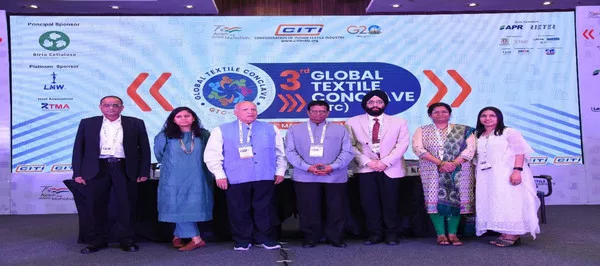
Panellists for the ‘Skilled Workforce For Strong, Sustainable And Balanced Growth’ Session in CITI’s 3rd GTC in Jaipur
The ninth session of the Global Textile Conclave 2023 focused on the importance of a skilled workforce for sustainable growth in the textile industry. The session was moderated by Dr. Swapna Mishra COO, Textile Sector Skill Council (TSC), India and featured a panel of experts who provided insights on the challenges faced by the industry and the measures needed to develop a skilled workforce.
The panelists agreed that the textile industry is highly labor-intensive, with a demand for skilled and semi-skilled workers across various stages of the value chain. However, they also noted that the industry is facing a shortage of skilled workers due to a lack of training and development opportunities.
Dr. J.V. Rao Advisor, Textile Sector Skill Council (TSC), Ms Bia Cunha, Specialist in the textiles, clothing, leather and footwear sector, The International Labour Organization (ILO), Dr. Seshadri Ramkumar Professor, Nonwovens & Advanced Materials Laboratory, Texas Tech University, Mr. Somes Bhaumik V P Operation, TRADC, Birla Cellulose, GRASIM, Mr Gurpreet Singh CGM – Technical, Vardhman Textiles, Mr. Padma Raj Keshri Sustainability Expert, Ex Shahi exports, Alumni NID, NIFT, IIM Indore, Dr. Ritu Pandey Assistant Professor, Department of Textiles & Clothing, Faculty of Home Science, CSAUAT, Kanpur, Ms. Shubhi Sachan Founder, Material Library of India were the esteemed panellists for the session.
The panelists discussed the impact of technology on the workforce.
Overall, the panelists emphasized the need for a holistic approach to developing a skilled workforce. They suggested that industry, academia, and the government should work together to provide training and development opportunities, improve working conditions, and promote sustainability to attract and retain talent in the textile industry. They also highlighted the need for continuous upskilling and reskilling to keep pace with technological advancements and changing market demands.
Session 10: Textiles & Apparel Industry: Best Practices
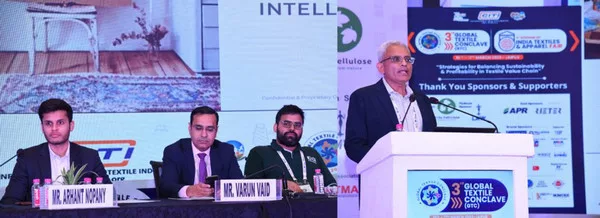
Panellists for the ‘Textiles & Apparel Industry: Best Practices’ Session in CITI’s 3rd GTC in Jaipur
The session on Textiles & Apparel Industry: Best Practices was moderated by Mr. Varun Vaid, Business Director at Wazir Advisors, and featured a discussion on geopolitics and India’s position in the global textile and apparel trade.
Entrepreneurs Mr. Garvit Sahdev, founder of InfiniteX, and Mr. Vivek Mehra, founder of OnlyGood, also shared insights on their startups and their impact on the industry.
The session highlighted the impact of geopolitics on the global textile and apparel trade, particularly the China+1 sentiment, which has given India an edge in the industry. However, low productivity and non-tariff barriers continue to hinder India’s growth in the trade.
Mr. Garvit Sahdev discussed the circular business solutions provided by his startup, InfiniteX, which focuses on sustainability in retail brands. By providing circular solutions, InfiniteX helps retail brands reduce their waste and carbon footprint while also creating a positive impact on society.
Mr. Vivek Mehra, on the other hand, discussed OnlyGood’s ESG reporting tools solutions, which cater to all players in the trade, primarily manufacturers. These solutions help manufacturers report on their environmental, social, and governance (ESG) practices, thereby improving transparency and accountability in the industry.
The session shed light on the importance of startups in driving innovation and sustainability in the textile and apparel trade. The circular business solutions provided by InfiniteX and the ESG reporting tools solutions offered by OnlyGood are examples of how startups are playing a critical role in creating a more sustainable and responsible textile and apparel industry.
Furthermore, the session highlighted the need for India to increase productivity and reduce non-tariff barriers to compete effectively in the global textile and apparel trade.
The entrepreneurs and experts emphasized that collaboration and cooperation among stakeholders, including educational institutions and industry players, are key to achieving this goal.
Overall, the session emphasized the need for innovation and sustainability in the industry, as well as the importance of collaboration and cooperation to overcome the challenges facing the Indian textile and apparel trade.
CITI Textile Sustainability & CITI – BIRLA Awards 2023
The Confederation of Indian Textile Industry (CITI) launched the first Textile Sustainability Awards and a Fashion Show during the 3rd Global Textile Conclave held in Jaipur on March 16, 2023. The move is aimed at promoting sustainable practices in the textile industry and recognizing those who have made efforts towards sustainability, circularity, and traceability.
CITI has been promoting excellence in the textile value chain since 1993-94 through the CITI BIRLA Economic & Textile Research Foundation Awards.

CITI BIRLA Economic & Textile Research Foundation Awards being presented M/s Premier Mills Pvt. Ltd & Best Colour Solutions Pvt. Ltd
However, this year, CITI expanded its areas of focus to include sustainability, circularity, and traceability. The objective is to encourage the textile and apparel industry to chart a more aggressive path with both planet and people at the center of all activities.
The first-ever CITI Textile Sustainability Awards were launched with texfash.com as the Knowledge Partner. The awards were judged by an eminent jury. The objective of the awards was to recognize efforts being made toward sustainability and to incentivize others to tread the same path. The broader objective was to trigger a cascading effect of innovation and pragmatic work.
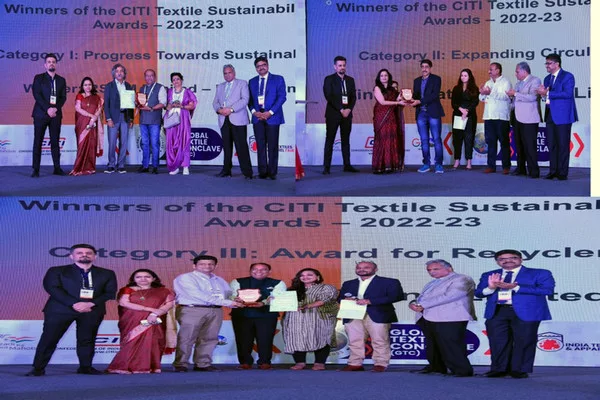
M/s RSWM Ltd – LNJ Denim, M/s Pratibha Syntex Ltd, and M/s Usha Yarns Ltd being presented with CITI Textile Sustainability Awards 2023.
The awards were given across three categories: Progress Towards Sustainability, Expanding Circularity, and CITI Reverse Resources Sustainability Awards for Recyclers 2023. M/s RSWM Ltd – LNJ Denim, M/s Pratibha Syntex Ltd, and M/s Usha Yarns Ltd respectively were adjudged the winners in the above categories.
The awards are expected to trigger more innovative and sustainable practices in the textile industry, reducing its impact on the environment. With initiatives like these, the textile industry can work towards creating a more sustainable future.
Fashion Show
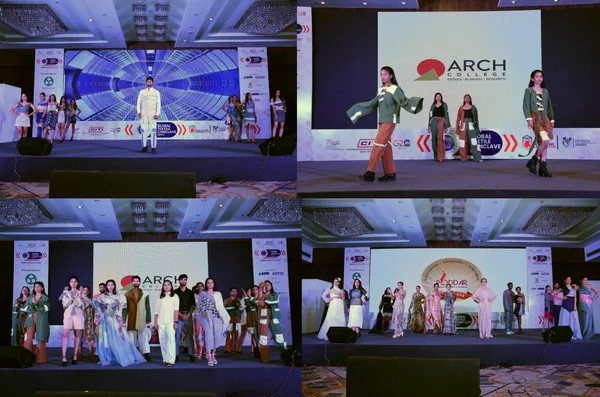
Glimpses of Fashion Show held on the sidelines of 3rd GTC in Jaipur
In addition to the award distribution ceremony, CITI also organized a Fashion Show with supporting partners – Apex University, Jaipur, Arch College of Design & Business, Jaipur, and Poddar International College, Jaipur. The theme of the Fashion Show was “Going Green.” The participating institutes displayed their collections on Cohesion, Remembering the Hues, and Eco Denim. Cohesion presented resort-wear in natural dyes in print and pattern, and use of sustainable khadi fabric. Remembering the Hues presented street-wear in unisex designs created on khadi with baggy silhouettes, kantha details, and pockets for utility. Eco Denim showcased how denim can be transformed into unique and fashionable items through upcycling.
Valedictory Session
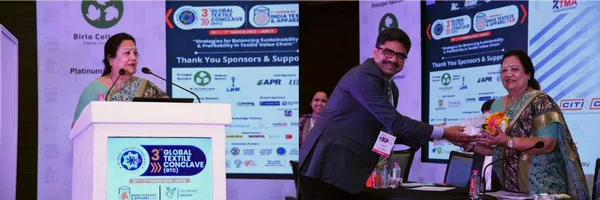
Smt. Darshana Vikram Jardosh Ji, Hon’ble Minister of State for Textiles and Railways addressing the Valedictory Session of 3rd GTC held in Jaipur
The 3rd Global Textile Conclave (GTC) concluded on a successful note with the presence of Smt. Darshana Vikram Jardosh Ji, Hon’ble Minister of State for Textiles and Railways, who graced the Valedictory Session as the Guest of Honour.
The Minister highlighted the importance of the Textile Industry in India’s global contributions, particularly in light of India’s presidency of the G20. She also emphasized the need for the industry to innovate and adopt new technologies to meet the emerging needs of the market.
The event was organized by the Confederation of Indian Textile Industry (CITI), which received appreciation from the Minister for its efforts towards promoting sustainability in the industry. The Chairman of CITI, Shri T. Rajkumar, thanked the attendees and the Indian government for supporting the Textile Industry. He also congratulated the winners of the CITI Textile Sustainability Awards and urged the industry to adopt sustainable practices in the long run.
The Secretary General of CITI, Ms. Chandrima Chatterjee, announced the next edition of the GTC, which will be held in Ahmedabad in February 2024, in collaboration with Spinners Association Gujarat and other regional textile associations. The President of SAG, Mr Ripple Patel, confirmed the participation of major textile associations from Gujarat to make it the mega textile event of 2024.
The Deputy Chairman of CITI, Shri Rakesh Mehra, proposed a Vote of Thanks to conclude the successful event.

